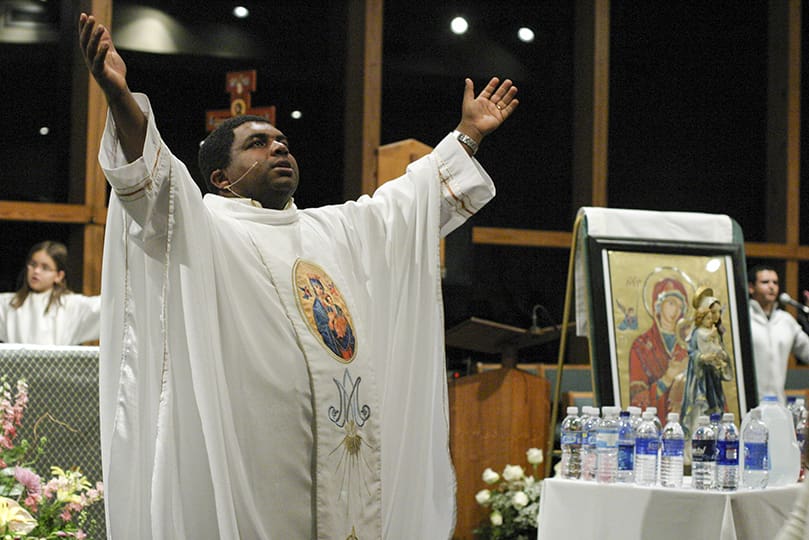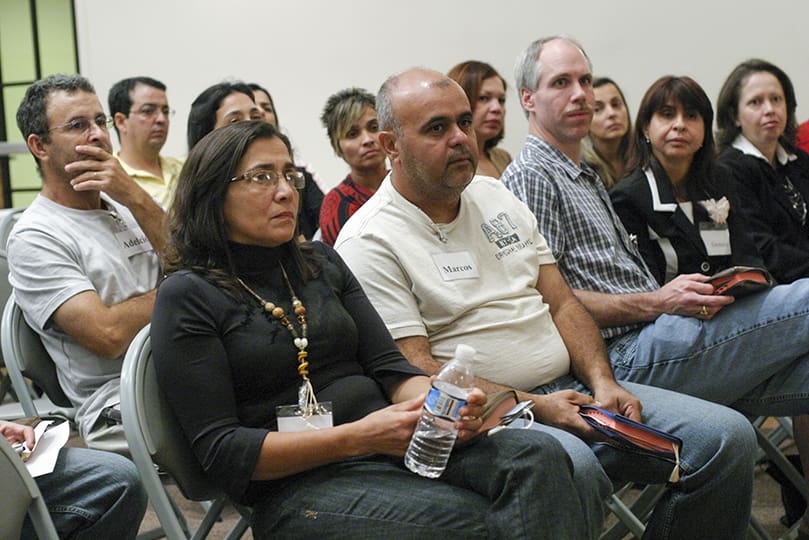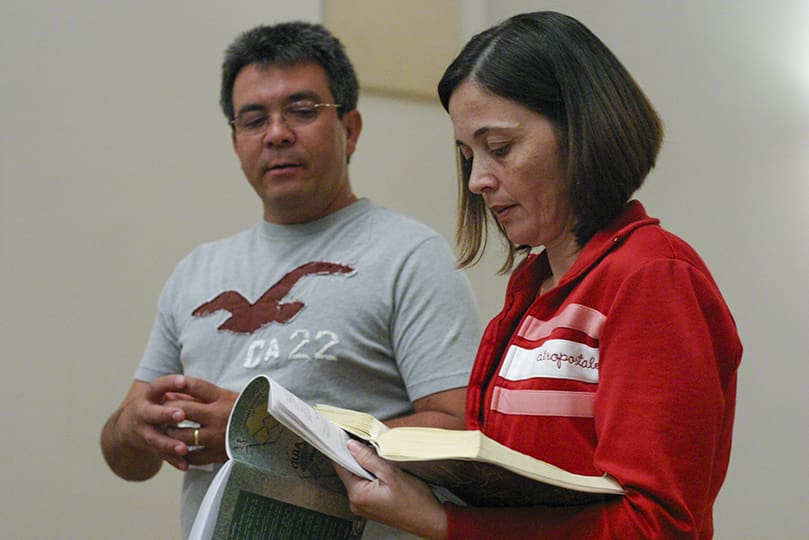Father Roger Araujo is the main celebrant for the 8 p.m. Mass at Holy Family Church, Marietta. He heads up the Brazilian ministry at St. Jude the Apostle Church too. Photo By Michael Alexander
Atlanta
Brazilian Community Celebrates Marian Feast With Joy
By STEPHEN O’KANE, Staff Writer | Published November 13, 2008
Waving blue and white fabrics high above their heads in homage to the Blessed Virgin Mary, nearly 400 Brazilians clapped and sang in Portuguese, marking the beginning of the feast day Mass of Our Lady of Aparecida, the patron saint of Brazil.
The Mass was a gathering of the growing Brazilian community in metro Atlanta, and Archbishop Wilton D. Gregory, who celebrated the Mass at St. Jude Church on Sunday, Oct. 12, used the opportunity to express his delight in their presence in the archdiocese.
“This feast is … a welcome opportunity for me as the pastor of this local church to pay tribute to the presence of so many of our Brazilian brothers and sisters and to honor the Mother of God who has manifested herself to these wonderful people and thus continued her legacy of responding to the needs of her children wherever we might live or whatever language and culture we might claim,” the archbishop said.
The Catholic Brazilian community took root in the archdiocese nearly 10 years ago when Jesuit Father Jack Vessels came to Atlanta. The Portuguese-speaking priest, who came to Ignatius Retreat House after serving in Brazil, began celebrating a monthly Portuguese Mass at St. Jude.
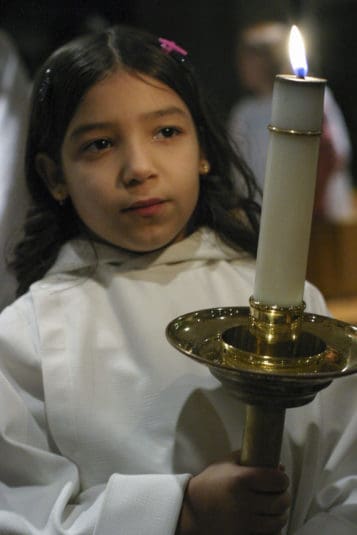
Seven-year-old Luanny Luiza Xavier carries a candle in the opening procession of the Tuesday evening Brazilian Mass at Holy Family Church. Photo By Michael Alexander
Not long after, Father Pedro Poloche Rodriguez, a priest of the Atlanta Archdiocese, began helping Father Vessels serve the community and the Portuguese Mass became semimonthly.
The two priests worked together to bring a Brazilian priest, Father Sebastian Andrade, to the Atlanta area in May 2002 as they saw the number of Brazilian Catholics steadily rising. Father Andrade, who ministered in Brazil for more than 20 years and in Canada for 15 years, began offering a weekly Portuguese Mass at St. Jude.
Last year members of the Brazilian Catholic organization Canção Nova, or “New Song,” who were stationed in Dallas, Texas, met with Archbishop Gregory to discuss the status of the Atlanta community.
Vinicius Adamo, who now works with Canção Nova in Atlanta, said the archbishop “immediately asked us to move to Atlanta.”
“He invited us to come because he knew there was a need,” Adamo said.
The organization, which was founded by Father Jonas Abib nearly 30 years ago, will receive pontifical approval in November. Ministering through popular media, such as television, radio and the Internet, as well as through social programs, Canção Nova is aimed at bringing about a “new world.”
“We believe that only the Gospel of Our Lord Jesus Christ is capable of transforming people into new men and new women, who will build that new world. A new world we have been long waiting for and which we justifiably look for with all our hearts. We are entitled to it, we have the right of looking for it,” Father Abib wrote on the organization’s Web site.
Father Roger Araújo, who served with the life committee at Canção Nova in Texas, was brought to Atlanta in April to continue the ministry. Currently there are three Brazilian Masses per week, which see an average of 300 people per Mass.
On Tuesday and Saturday evenings, a Portuguese Mass is celebrated at Holy Family Church in Marietta, while Sunday evening Masses are celebrated at St. Jude.
According to 2004 U.S. Census data on foreign-born population, at least 20,000 native-born Brazilians are present in the Atlanta area, although the number of Brazilians, including those born in the United States, is believed to be as high as 30,000.
Most Brazilians reside in the north metro counties of Cobb, Fulton and Gwinnett, although there are also families in Fayette and Henry counties.
Their presence was affirmed earlier this year when Gov. Sonny Perdue and newly appointed Brazilian Consul General Adalnio Senna Ganem announced the opening of a new consulate in Atlanta to serve the Brazilian community in the Southeast.
Brazil is the largest country in South America, nearly the size of the United States, with over 186 million people and is known for agriculture, mining and manufacturing.
The feast of Our Lady of Aparecida (in Portuguese Nossa Senhora da Conceição Aparecida) is a major Catholic feast in Brazil celebrated on Oct. 12.
The feast recalls the miraculous story of three fishermen, Domingos Garcia, Filipe Pedroso and João Alves. In 1717, the fishermen were sent out by the local authorities to fish in the Paraíba River. After catching nothing, they arrived at a place called Porto Itaguaçu.
Alves threw his net into the water and found a statue of Our Lady in the net, but the head was missing. The fisherman threw out his net again and found the head of the statue. According to the legend, the next cast produced an abundance of fish for the three fishermen, filling their nets.
The statue remained with Pedroso’s family for the next 15 years. According to the story, many prayers were answered and the statue’s fame began to grow. The family built a prayer chapel in 1734 near the site of its discovery and, as the number of visits of the faithful increased, construction of a basilica began in 1834.
Our Lady of Aparecida was proclaimed Queen of Brazil and its official patroness by Pope Pius XI in 1929. A much larger basilica was started in 1955 and today is the second-largest Catholic place of worship in the world, second only to St. Peter’s Basilica in Rome. In 1984, the basilica was officially declared the largest Marian temple in the world.
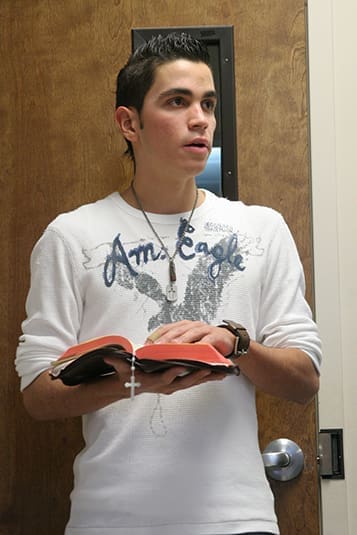
Eighteen-year-old Braulio Galvao, one of the youth leaders present for the gathering, holds a Bible from which he reads scripture passages. Photo By Michael Alexander
“There are obvious similarities to be found in the tradition of this Marian feast and the New Testament story of the miraculous catch of fish, in which Jesus engaged with his disciples in making them not merely conventional fishermen, but those who actually catch the men and women whom the Lord himself continues to pursue and invite into his church,” said the archbishop during the feast day Mass.
Members of the Brazilian community dressed as the three fishermen processed to the altar with a replica of the statue, where Archbishop Gregory incensed it.
Throughout the joyful Mass, many waved blue and white fabrics, representing the colors of the Blessed Virgin Mary, during the songs while others clapped or danced.
“It is a way of expressing excitement,” said Adamo, noting that this is a common sight in Brazil. “It is not only singing but a using of bodies (to worship).”
As the number of Brazilian Catholics grows in Atlanta, and the number of Portuguese Masses increases, more and more ministries are being formed to support the community.
Marcos Fernandez, who works with the community at St. Jude, said regular catechism classes are held at the church on Sunday and a youth group and a family group have formed.
Without the support of the archbishop and the Archdiocese of Atlanta gathering the resources to meet this need would be very difficult, leaders said.
“The archdiocese has been so supportive,” said Fernandez, mentioning that members of the Brazilian community have been asked to be present at the Eucharistic Congress for the past few years.
But “there is a lot to grow still,” said Adamo. “Everything is in the beginning.”
Their presence enriches the archdiocese, Archbishop Gregory said.
“Our own local church has been graced to receive an ever-increasing number of Brazilian neighbors and friends,” the archbishop told the congregation.
“As we gather in festive joy with the Brazilian Catholic community, we ask once again that Our Lady of Aparecida bless this particular family with the grace of true unity and harmony, and may that gift descend richly upon all here in the Archdiocese of Atlanta since we all belong to her as her children whatever our culture, language or race may be,” he concluded.
Mass in Portuguese is celebrated every Saturday evening at 7:30 p.m. (Vigil Mass for Sunday) and every Tuesday at 8 p.m. at Holy Family Church, 3401 Lower Roswell Road, Marietta. Mass in Portuguese is celebrated every Sunday evening at 7:30 p.m. at St. Jude Church, 7171 Glenridge Drive, NE, Atlanta.
